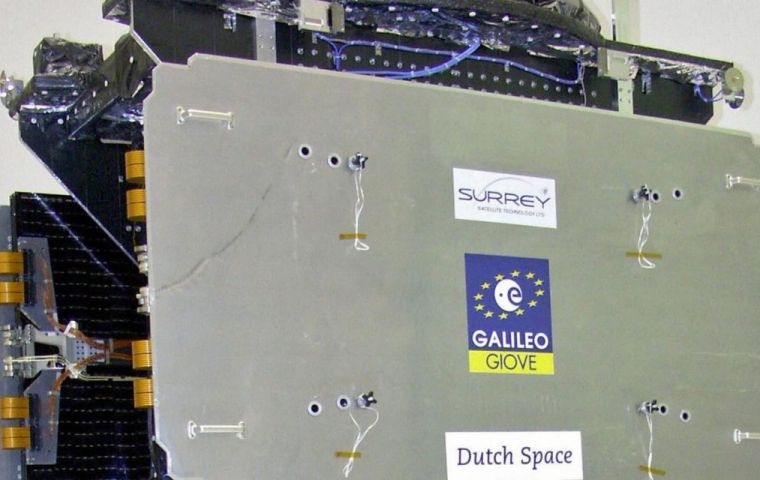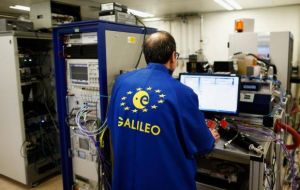MercoPress. South Atlantic News Agency
UK may have to start new satellite system post-Brexit
 Britain is already being frozen out of the program despite there being many months until it will actually leave the EU.
Britain is already being frozen out of the program despite there being many months until it will actually leave the EU.  The EC has started to exclude Britain and its companies from future work on Galileo ahead of the country’s exit from the EU in a year's time
The EC has started to exclude Britain and its companies from future work on Galileo ahead of the country’s exit from the EU in a year's time The UK might have to set up its own satellite navigation system if it is thrown out of the Galileo project after Brexit, according to British officials. Galileo is a €10 billion program that was launched by the EU to rival the US global positioning system.
Galileo is Europe’s rival to the global positioning system developed and controlled by the US, used by millions of consumer devices around the world in a multibillion-dollar satellite market.
Britain is already being frozen out of the program despite there being many months until it will actually leave the EU. Officials are also considering whether the UK could refuse the EU access to ground stations in two British Overseas Territories: the Falkland Islands and Ascension Island.
The UK has spent €1.4bn on the project which has prompted Business Secretary, Greg Clark, to take legal advice on whether the UK can reclaim the cash.
He said: “The UK's preference is to remain in Galileo as part of a strong security partnership with Europe. If Galileo no longer meets our security requirements and UK industry cannot compete on a fair basis, it is logical to look at alternatives.”
The European Commission has started to exclude Britain and its companies from future work on Galileo ahead of the country’s exit from the EU in a year's time, a move which Clark said threatened security and defense collaboration.
Airbus, the company responsible for controlling the satellites – which are assembled by its subsidiary, Surrey Satellite Technology – is one of the companies affected by the decision by the European Commission and has had to look to move some of its UK-based Galileo operations to a European country after Brexit.
Airbus operates Galileo's ground control services from Portsmouth in southern England and the spokesman said that about 100 jobs would be put at risk if it must move.
Galileo is seen as a vital back-up system for both civil and military purposes when it becomes fully functional after 2020. In particular its enhanced encryption — making it highly resistant to efforts either to jam its signal or to spoof the navigation system into believing it is somewhere else — are considered key by the US, the UK and other EU member states.
The UK has so far done well out of the Galileo project, launched in 2003: it has funded roughly 12% of the annual budget and received a work share of more than 15%. Officials are also considering whether the UK could refuse the EU access to ground stations in two British Overseas Territories: the Falkland Islands and the Ascension Islands.




Top Comments
Disclaimer & comment rules-

-

-

Read all commentsThere's another “interesting” wrinkle. A number of the Galileo ground stations are in British territory. And when Britain closes them down?
Apr 27th, 2018 - 05:41 pm +1No Gold Code for you. Next!
Apr 26th, 2018 - 03:14 pm 0The question is why is this piece appearing in Mercopenguin, a British government propaganda organ supposedly devoted to America, South America and the “South Atlantic”?
Apr 30th, 2018 - 03:49 am 0Commenting for this story is now closed.
If you have a Facebook account, become a fan and comment on our Facebook Page!